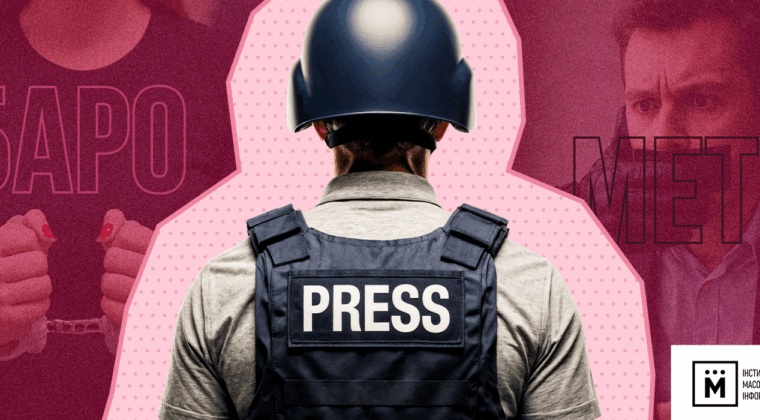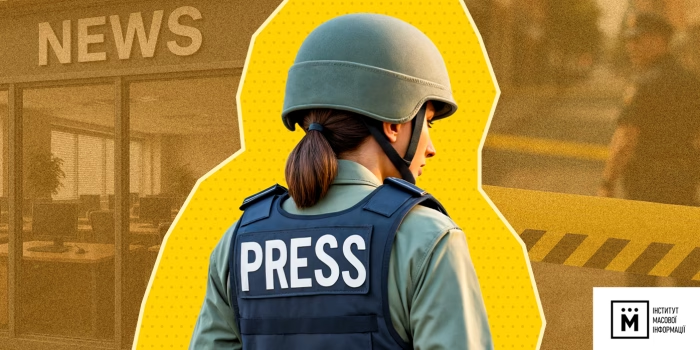The NGO “Institute of Mass Information” has prepared a brief analysis of the so-called “misinformation bill” that the Ministry of Culture, Youth and Sports has published on its website.
After having read the bill, IMI does not recommend to MPs to vote for, and to the Ministry not to submit the bill to the parliament. The document contains some ambiguous norms that are unacceptable in a democracy.
The main components of the bill:
- Introducing the narrow concept of misinformation as a purely untruthful information on the issues of great public importance and introducing responsibility for misinformation.
- Establishing of a special state body – the News Commissioner – and providing it with broad and monopoly powers in the field of information.
- Forming of a special body – the Association of Professional Journalists of Ukraine (APJU).Only APJU press card holders will be able to be called “professional journalists” and enjoy the protection of the state, in particular from obstruction of their legitimate professional activity. Only “professional journalists” will be able to be accreditated to the public meetings held by public authorities.
- In addition to the “professional journalist”, they introduce the term a “journalist” (all those who did not want to join the Association) and “disseminator of information” (in fact, it covers all users of social networks).The simply “journalists” will be restricted in getting access to public authorities and will not have other types of protection and guarantees of their professional activities (in particular, protection against crimes to prevent to fulfil journalistic activity). All “disseminators” will be obliged to disseminate only authentic information and to verify its authenticity before it is made public, while at the same time further ensuring its “openness and transparency” (?).
- Introducing of the Trust Index to be assigned to the mass media in the manner and in accordance with criteria approved by the State Commissioner, based on an evaluation by an independent organization selected by the Commissioner.It is unclear what these organizations will be and what level of competence they are invited to choose.
Misinformation
A deliberate misrepresentation of important issues is a threat for society and this is difficult to contest. The current legislation of Ukraine does not provide for liability for dissemination of false information regarding the whole society. But, perhaps, the drafters made a mistake in translating the term “fake news”, which they only reduced to spreading information about facts that did not exist, because in real life it is a much broader concept.
Let there be, the mechanisms for response to dissemination of misinformation in the bill are defective, to say the erronous.
First, responding to such socially dangerous action as the dissemination of an inaccurate information about socially important issues is not carried out by law enforcement agencies under the procedure already provided for by the Criminal Procedure Code, not by the National Council, which is at least theoretically is more independent regulatory body, but by a newly created regulatory body, which is the News Commissioner, whose status and authority raises many questions. At the same time, there is no response to misinformation from other actors. Secondly, not only the media or officials are subjects of misinforming, but also ordinary citizens, whom the bill calls “disseminators of information”. This makes it possible to prosecute anyone simply for the reposting of any information on social networks – and such bringing to account will not take place in compliance with the procedure established by the criminal procedural legislation.
This approach equates the responsibility of the fake authours and those who believed them and simply reposted the news (as well as the site owner, if the fake authour is not identified). This is a violation of fairness and proportionality of punishment, depending on the degree of public danger of action. Simply put, the level of influence and, accordingly, the level of public danger of fabricating a fake news on some military or environmental threat and just repost of such a “news” on social networks by alarmed persons cannot be considered as equal ones. Thus, the response of the state must be different for it. The law in vigour is ensuring it by means of some special provisions of criminal procedural law, but the draft law on misinformation does not contain such fuses.
The bill reduces all regulation in this area to the activity of the state information commissioner. Moreover, without proper control over his activities by the public and without the possibility of preventing abuse of power and office.
Recall that the current legislation of Ukraine already provides mechanisms for responding to the dissemination of false information, and at several levels:
- The requirement to refuse false information or to provide a right of reply is a civil liability in the form of compensation for pecuniary or non-pecuniary damage caused by the dissemination of false information used in cases where the information is disseminated regarding any natural or legal person.
- Administrative liability under the Code of Administrative Offenses against individuals who disseminate inaccurate or false information, such as spreading false rumors that may cause panic among the population or disturb public order (Art. 173-1 of the Code of Administrative Offenses).
- Criminal liability for the dissemination of publicly prejudicial information, regardless of the presence of falsehoods, such as public calls for violent change or overthrow of the constitutional order or seizure of state power, and distribution of materials calling for such actions (Article 109 of the CCU) or public appeals or dissemination of materials calling for the change of borders of the territory or state border of Ukraine in violation of the procedure established by the Constitution of Ukraine (Article 110 of the Criminal Code).
Summing it up. The intent of the state to respond to misinformation is clear, but the response mechanism does more harm than good. Unfortunately, this seems more like a discredit to the fake news idea itself.
Commissioner for Information
The bill envisages establising of a special authority entity : the News Commissioner.
The Commissioner shall be appointed and dismissed by the Cabinet of Ministers of Ukraine. The Regulation on the Commissioner and his representatives shall be approved by the Cabinet of Ministers. At the same time, it is noted that the Commissioner fulfil one’s functions independently of other state bodies and officials. Thus, his functioning does not meet the requirements of the Article 6 of the Constitution of Ukraine, according to which state power in Ukraine is exercised on the basis of its division into legislative, executive and judicial. After all, the commissioner does not meet the signs of the executive power, but he is appointed, and dismissed by the executive branch of power.
Although the provisions of the bill said that the activities of the Commissioner are to supplement the existing remedies for the rights and freedoms of the individual and the citizen, they do not abolish them or translate into revision of the competences of the state bodies providing protection and restoration of the violated rights and freedoms – this does not comply with other provisions of the draft law. The Commissioner has extremely wide and in some cases monopoly powers. In particular, he is entitled to demand response or denial of misinformation to the disseminators of information, to seize the court demanding to recognize of relevant information as misinformation, to retract or reply to some misinformation, demanding to comply with obligation of the disseminator of information to respect this law, etc.
The Commissioner has the right to seize the court asking to restrict access to information disseminated through the Internet or via the instant messaging service (?), to restrict access to some web page, website or account of the instant messaging service – at the same time, the procedure is as follows that the disseminator of information can not object to blocking your site.
The Commissioner has the right to be acquainted with documents, in particular those containing information with restricted access, and to obtain their copies in state authorities, local self-government bodies, public associations, enterprises, institutions, organizations, regardless of ownership, prosecutor’s offices, including cases pending in the courts.
The Commissioner is obliged to be involved as a third party in litigation to refute inaccurate information disseminated massively, even if it concerns an individual legal or natural person, including an official.
The Commissioner shall have the right to contact the technical intermediaries and system and domain name registry administrators with purpose to obtain the identity of the information disseminator, but at the same time, the owner of the webpage, website or account or technical reseller must immediately, no later than 24 hours after receiving the request of the authorized person provide him or her with the identity of the media disseminator. If the technical intermediary did not provide the requested information within the deadline set by this law, the court may, at the request of the commissioner, oblige the technical intermediaries to restrict access to a website, website or account whose owners violated the requirements of the law on transparency of the disseminator of information.
If there is no data on identity of the disseminator, the Commissioner shall seize the court for recognition of the fact of dissemination of misinformation. If the application is upheld, the court acknowledges this fact, with or without access to misinformation.
Cases based on complaint from the Commissioner for blocking sites or posts in other messengers are subject to the decision of the court of first instance within three days from the day the application is received. The Commissioner shall seize the court for a restriction on access to a web page, website or account, or information on the Internet, or extended via instant messaging service in case of lack of the owner’s identification data, as provided by the Law of Ukraine “On Information”.
In addition, the Commissioner seizes the court demanding to impose fines. The imposition of fines does not involve inviting the disseminator to a court hearing. At the same time, the minimum fine is from UAH 4 723 000 (around $193 643).
Currently, the draft law stipulates that the Commissioner and his representatives are not civil servants and are not covered by the Law of Ukraine “On Civil Service”.
Thus, the draft law creates mechanisms for state interference in the information sphere in the form of the News Commissioner, who is entitled with extraordinary powers to intervene in any aspect of information activity in Ukraine without the existence of preventive mechanisms against abuse. Also, the extraordinary powers to intervene in the information activities of the commissioner are not based on expert opinions or other comprehensive and objective analysis of information, but on the commissioner’s or his representatives’ own beliefs and their personal perception of the presence or absence of signs of misinformation in any information. Such a mechanism is not in line with Ukraine’s international obligations, in particular the provisions of Article 10 of the Convention on Human Rights and Fundamental Freedoms and the case law of the European Court of Human Rights.
Association of Professional Journalists of Ukraine
The bill proposes to form the Association of Professional Journalists of Ukraine, which will be the only non-governmental non-profit professional organization of journalists in Ukraine, which is formed and operates to ensure the fulfillment of the tasks of self-government of journalists. According to the bill, the APJU cannot be reorganized or liquidated. At the same time, the authors, for some reason, wrote down in the text of the bill the statute of the APJU, indicating the cells in the regions, decision-making procedures, voting procedures, governing bodies, who can enter there, voting procedure, contribution rates and so on. A real self-regulatory organization must itself write down and approve its charter. Such specification in the bill and even the ban on reorganization are superfluous.
The governing bodies of the Association (Journalists’ Council and the Committee of Professional Ethics) will be allowed to admit only those “professional journalists” who will submit on the website a declaration of the association in the form of a declaration of a person authorized to perform the functions of the state or local government, and who have more than 75% of the total income for the last five years they got for providing services of gatheirng, receiving, creating, editing or disseminating information. For example, in Germany, the local union of journalists admits those persons who have more than 50% annual income for journalistic activity.
The Association is formed by the constituent assembly of journalists, to which three journalists are delegated from seven organizations, which are clearly named in the bill – the National Media Association, the Association “Industrial Television Committee”, the Ukrainian Association of Press Publishers, the National Public Television and Radio Company of Ukraine, Commission of Journalism Ethics, the National Union of Journalists of Ukraine and some legal entities that are part of the State International Broadcasting of Ukraine. Why the authors of the bill chose these organizations and by what criteria, this is unknown. It is only obvious that at least two of them, the National Union of Journalists of Ukraine and Commission of Journalism have a direct conflict of interests, since the APJU is in fact a rival for them and occupies their niche.
As for membership in the APJU, they admit all who wishes in. In particular, to become a member of the Association, it is enough to have full civil capacity, to be a citizen of Ukraine (or a person who has the right of permanent residence in Ukraine) and experience of work in journalism for at least three years. Within the period of adhering the APJU, those wishing have to “accept and abide by the Journalist’s Code of Professional Ethics”. That’s all. What can be the credibility of an organization that counts absolutely everything: from thugs for hire to apologists of the “Russian dimension”, this is a rhetorical question. Only some categories of citizens, including foreigners, members of political parties, persons with unspent conviction for crimes, persons who are on the list of those who pose a threat to national security, and employees of media“under sanction”, were denied membership in the APJU.
You get an impression that you can be a hard-core “jeansa”-man and proudly be a “professional journalist”. In spite of all the details of the statute of the Association of Journalists there are no clear norms in the bill that would explain how the Agency will monitor the observance of the Code of Professional Ethics by “professional journalists”.
They may revoke a person from the association for a number of disciplinary violations, in particular for violations of journalistic ethics, on a non-anonymous complaint, which should be considered by the governing body of the Association of Journalists – Journalists’ Ethics Committee. The decision shall be taken by a simple majority of votes. The question is: if everyone is accepted to the association, where is the guarantee that the ethics committee will not include representatives of thugs for hire and fake journalists from all over Ukraine who will vote “for theirs” in a friendly and simple majority? By the way, the press card will be issued for the whole period of membership in the association – there is no provision for any periodicity or regular confirmation that the person continues to work as a journalist.
Membership in the association will give the status of “professional journalist”. This status alone will allow to work in emergency situations, to be accredited with the authorities, and to provide criminal justice protection as a journalist and not to the average citizen (Articles 171, 345-1, 347-1, 348-1). It is curious to see that, according to the draft law, only the Prosecutor General, his deputy, the prosecutor of the Autonomous Republic of Crimea, the region, the city of Kyiv and the city of Sevastopol can press suspicion of some criminal offense to the professional journalist.
In conclusion, it can be noted that the proposed draft law does not fulfill the functions of protecting Ukrainian society from the dissemination of socially harmful information and misinformation. Instead, it creates mechanisms for total control over the media landscape, not only over traditional mass media, but also over ordinary citizens who exchange information in any way. Additionally, special state control over journalistic activities is established and journalist are deprived of their rights when they fail to pass special registration procedure and are not subject to special control in accordance with state-established procedures. In this form, the bill violates the very principles of existence of Ukraine as astate of rule of law, which shares European values and seeks to build a full-fledged democratic society. The draft law should be revised in accordance with the general principles on freedom of expression laid down in the Constitution of Ukraine and international normative acts, in particular with regard to minimizing state interference in the exercise of freedom of speech and carrying out such interference solely on the basis of law, only to achieve a legitimate aim and to the extent necessarily in a democratic society.



